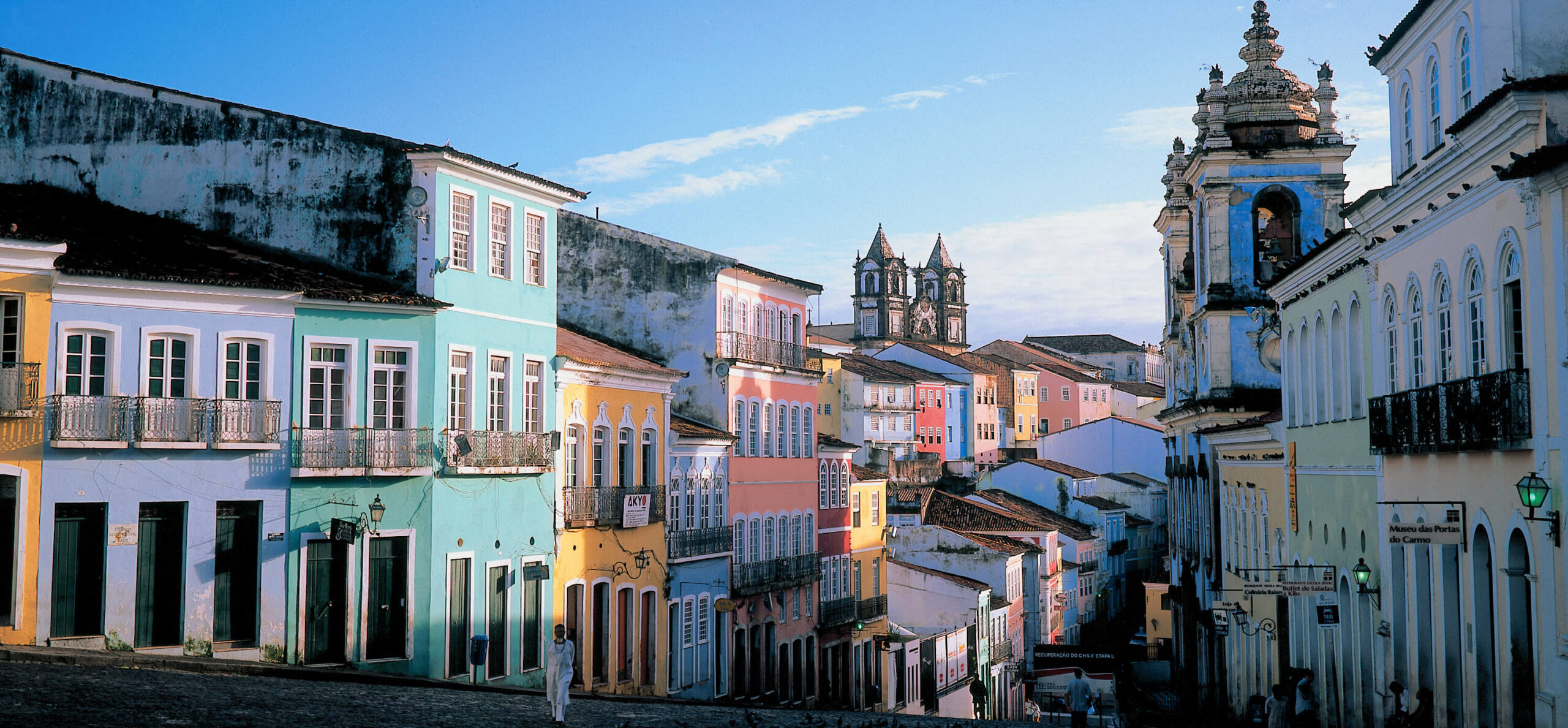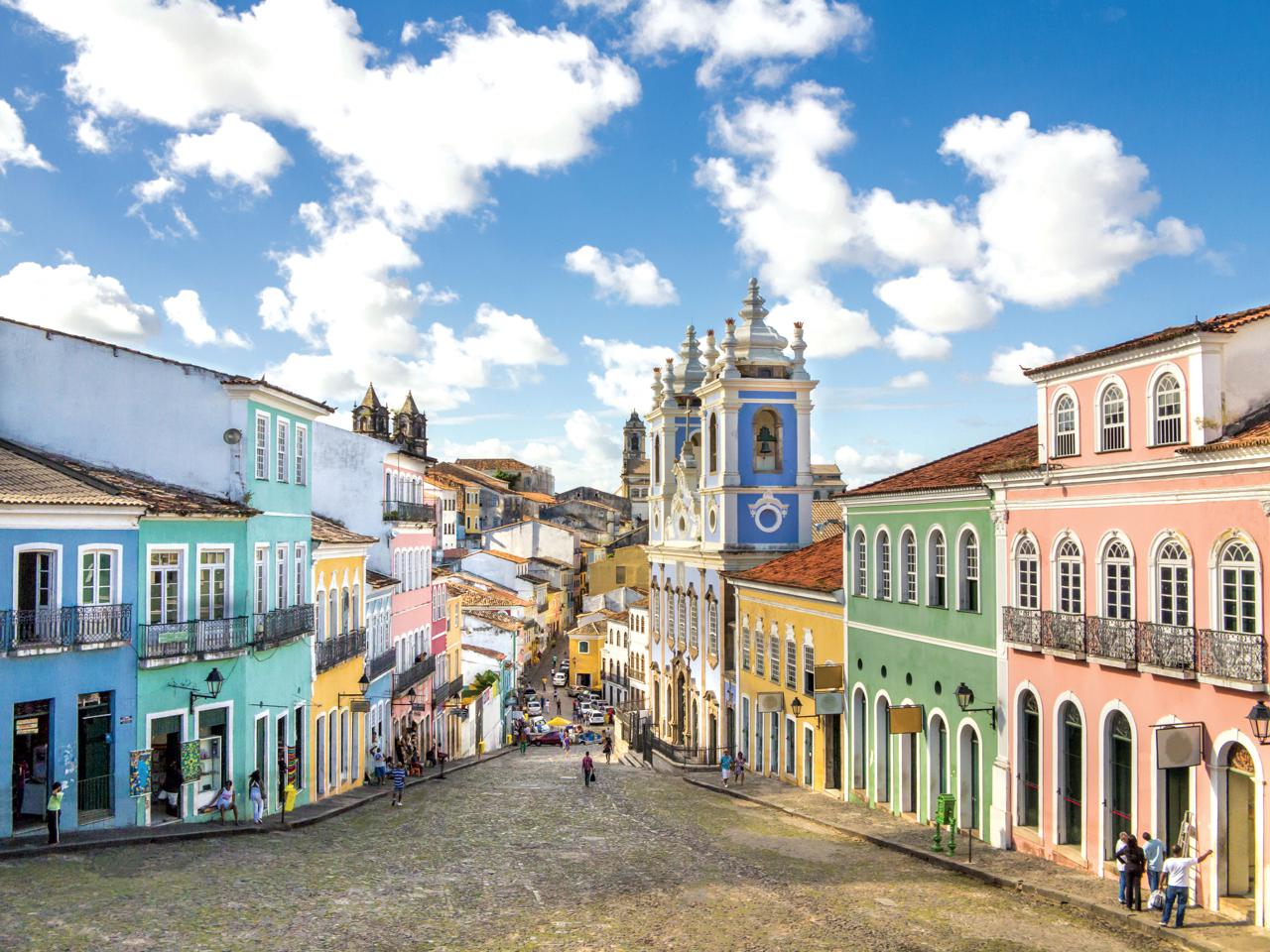

If Rio de Janeiro is Brazil’s heart, then Salvador is its soul. There’s less glitz than you’ll find in Rio and less money than in Sao Paolo, but it has an irrepressible spirit that outshines them both. The people are constantly on the move, dancing through the streets or performing traditional capoeira in the squares. Brilliantly costumed women, wearing the traditional Baiana de Acaraje dress of petticoats and hoop skirts with elaborate head wraps, walk the streets. The city hums with music and drums at all hours of the day and night. Salvador is at once intoxicating and overwhelming. Brace yourself.
Founded by the Portuguese in the mid 16th century, Salvador is one of the oldest colonial cities in the Americas and was the first capital of Brazil. But behind the brightly coloured facades lie some dark secrets; Salvador is a city built on human suffering. The first slave market in the New World opened here in 1558 and over the next 300 years more than 3.5 million slaves passed through it. Slavery was abolished in Brazil just 130 years ago and, as a result, Bahia is still the most African of the states. Around 80 per cent of Salvador’s population is of African descent.
Today, the city is split across two levels, the upper and lower town. They are connected by the striking Elevador Lacerda, a 70-metre high elevator built in 1873 and still in use today. The old town, Pelourinho, is in the upper section, made up of narrow winding streets, cobblestone squares, ornate stone churches and colonial buildings in a rainbow of pastels. More modern suburbs and high rises line the lower part of town, running along the coast. Salvador is a beach town, and they are heaving. Here, beaches are not just a place to sunbake. They are a place to meet friends and family, play music, dance, drink beer, barbecue and flash plenty of flesh in the skimpiest of swimsuits.
See & Explore
Brazil is the world’s largest Catholic country and a nation deeply tied to its faith. In Salvador, elements of Catholicism have been incorporated into the local Afro-American religion, Candomblé. It brings together different tribal beliefs from across Africa, incorporating them within the Catholic faith of the colonising Portuguese. Saints become orixas, or gods, who form a link between humans and the spirit world. At the grand Church of Nosso Senhor do Bonfim, one of Salvador’s most famous Catholic churches, a sea of coloured ribbons utter along the fence. Each of these ribbons is a prayer dedicated to an orixa, asking for healing or love or hope. Local superstition has it that you tie an appropriate ribbon to your wrist and when it comes off naturally (which could be many weeks later) your wish will be granted.
Get a glimpse of Bahia’s rich multicultural history at the Balé Folclorico da Bahia, a folk performance held in a small theatre in Pelourinho. It’s a captivating performance of traditional stories, songs and dances, with elements of the Candomblé (including appearances by some of the orixas) and capoeira, as well as incredible feats of athleticism. It’s
loud and joyful, and always met with a well-deserved standing ovation.
The historic Fort de Sao Diogo, on the edge of Barra Beach, dates back to the early 17th century. In 2016 it was given a modern update and now houses the Carybe Space of Arts. Carybe is one of Bahia’s most famous contemporary artists, working as a painter, sculptor, illustrator, engraver and potter. Born in Buenos Aires, Carybe fell in love with the spirit of Bahia, and later became a Brazilian citizen. He produced over 5000 works capturing the vibrancy of the Afro-Brazilian culture. The museum is only small but has some impressive interactive technology, though much of it is available only in Portuguese.
Eat & Drink
Head to the night markets at Rio Vermelho to sample Salvador’s most famous street snack, acaraje. A sort of Afro-Brazilian falafel, acaraje are made from crushed black beans shaped into a ball, stuffed with dried shrimp, onion or spices, and deep fried in red palm oil. Grab a seat at one of the plastic tables and wash it down with an ice-cold beer.
For a more high-end take on Bahian cuisine, visit Casa de Tereza, just around the corner from the markets. The eclectic dining room is decorated with local artworks and and handicrafts (there’s an adjoining shop if you want to take some home). Order the Bahian tasting menu for bubbling pots of moqueca (a rich fish stew), feijoada (black beans with pork), fried croquettes, chopped steak and fried manioc, all washed down with an excellent South American red.
Brazilians are known for their sweet tooth, so don’t miss a stop at Sorveteria da Ribeira, an historic ice cream parlour in the lower town. There are more than 60 flavours available, most of them made with tropical fruits like banana, mango, coconut and pineapple, as well as South American natives acai berries and biribiri (a bit like a sour starfruit).
Stay
Sitting next to the soaring Sao Francisco church and convent in the heart of Pelourinho is La Villa Bahia. Set inside two adjoining colonial villas from the 17th and 18th centuries, it’s a sleepy, leafy escape from the searing heat and bustling crowds. There are 17 rooms spread across three floors, each with a unique layout and themed around different periods of the city’s history. The rooms on the top floor have small terraces and are worth the trek if the power goes out (which it often does). Behind the excellent restaurant is a tiny white- walled courtyard and an even tinier plunge pool (a rarity in this part of Salvador). There’s also a rooftop courtyard with chairs and a couple of daybeds, as well as incredible views over the old town. Bear in mind that all that greenery also attracts mosquitoes, so apply a good layer of insect repellant.
In the evening, order a glass of wine and sit in the window of the bar, overlooking the square. Groups of men gather in the dim streetlights to play cards or dice games, children run squealing across the cobblestones, and the sound of drums rumbles through the narrow streets.
Latest Articles
Don't miss the latest from Luxury Travel
